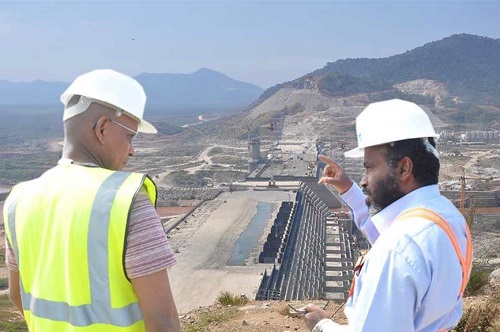Reuters photo
By
Tom Arms
Water, water… Where? Certainly not everywhere. Not anymore. The essential ingredient to life is becoming a disappearing and fought over commodity.
Nowhere is this more obvious at the moment than in relations between Egypt and Ethiopia over rights to the historic Nile.
Since the dawn of civilisation, the waters of the Blue and White Nile have joined at Khartoum to form the Nile River—the only source of fresh water along its 1,600-mile journey through the desert to the Mediterranean.
Egyptian civilisation grew out of the Nile more than 3,000 years ago. It is the reason that Egypt can continue to support its fast growing population of 100 million. But only just. The UN predicts that the combined pressures of a growing population, rising sea levels and industrial pollution will result in severe water shortages by 2025.
And that is without the Grand Ethiopian Renaissance Dam which is due to open later this year. GERD–as it is known in Ethiopia– will span the Blue Nile near the border with Sudan. It will cost $5 billion, every penny paid by the Ethiopian government. The dam will power a hydroelectricity plant expected to treble the country’s electricity output. Ethiopia will be transformed from a country supplying electricity to only 25 percent of its 75 million citizens into the powerhouse of East Africa.
But what about Egypt? The Ethiopians claim that the dam will have zero impact on water levels flowing through Egypt. But According to the Geological Society of America, the dam will reduce by at least 25 percent the flow of water through the land of the Pharaohs. Eighty-five percent of the Nile waters originate in Ethiopia.
The Egyptians have, unsurprisingly, complained loudly and at great length. In 2013 former President Mohamed Morsi threatened war.
From the Ethiopian, point of view, GERD has become more than a giant economic benefit. It is now an issue of intense national pride, similar to that felt by the Egyptian public over the Aswan High Dam in the 1950s and 1960s.
As the date of completion draws closer, tensions are rising faster than water levels are sinking. In January Egyptian, Sudanese and Ethiopian foreign ministers met in Addis Ababa to try to reach a compromise. Total failure.
Part of the problem is the prevaricating position of Sudan. It has a 1959 agreement to share Nile Waters with Egypt to which Ethiopia is not a party. At the same time it will benefit from the electricity power generated by GERD. And finally, it is in dispute with Egypt over the ownership of the 8,000 square mile Hala’ib Triangle bordering the Red Sea. Sudan, therefore, has a foot in both camps.
The dispute is further complicated by political instability in all three countries. Sudan has its long-running problems. Egypt is a dictatorship on the verge of enduring another joke election. Ethiopia is trying to balance the demands of half a dozen competing—and at times warring—ethnic groups. A conflict over the rights to the Nile could be just the cause any of them need to unite the populace behind an otherwise unpopular government.
Water is also causing difficulties elsewhere in the world. China has built seven hydroelectricity dams along the upper reaches of the Mekong River with plans for 21 more. This is lowering water levels in Laos, Cambodia, Thailand and Vietnam which rely on the Mekong waters for a fisheries industry worth $7 billion a year as well as irrigation for the region’s rice paddies.
China is potentially the world’s biggest threat to water supplies. It controls the headwaters of Indus, Ganges, Irrawaddy, Salween and Mekong Rivers. A billion people are provided with fresh water from those rivers and China’s rapid industrialisation and pressures to move from coal-powered to water-powered electricity generation is a danger to all of them.
Other areas threatened with water wars are the steppes of Central Asia, the fertile valley of the Tigris and Euphrates River and the Jordan River Valley. Populations are growing. Industrialisation is growing. Food production is growing. Water is evaporating.
Tom Arms
I am a journalist, entrepreneur and historian with extensive experience in print, web and broadcast journalism. I started as a diplomatic correspondent, wrote several books (The Falklands Crisis, World Elections On File and the Encyclopedia of the Cold War), and then in 1987 started my own business (Future Events News Service, www.fensinformation.com) which over 25 years established itself as the world and UK media’s diary. Our strapline was: “We set the world’s news agenda.” I sold FENS in December 2012 but retained the exclusive broadcast rights to all of FENS data. To exploit these rights I set up LookAhead TV which produces unique programmes which “Broadcasts Tomorrow Today” so that viewers can “Plan to Participate.” LookAhead has appeared regularly on Vox Africa, Radio Tatras International, The Conversation and Voice of Africa Radio.
In addition to being a syndicated broadcaster and columnist on global affairs, Tom is also available for speaking engagements and can be contacted on Twitter, Linkedin and email: [email protected].



No Comments Yet!
You can be first to comment this post!